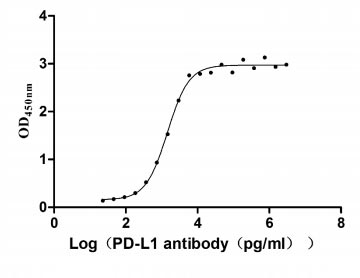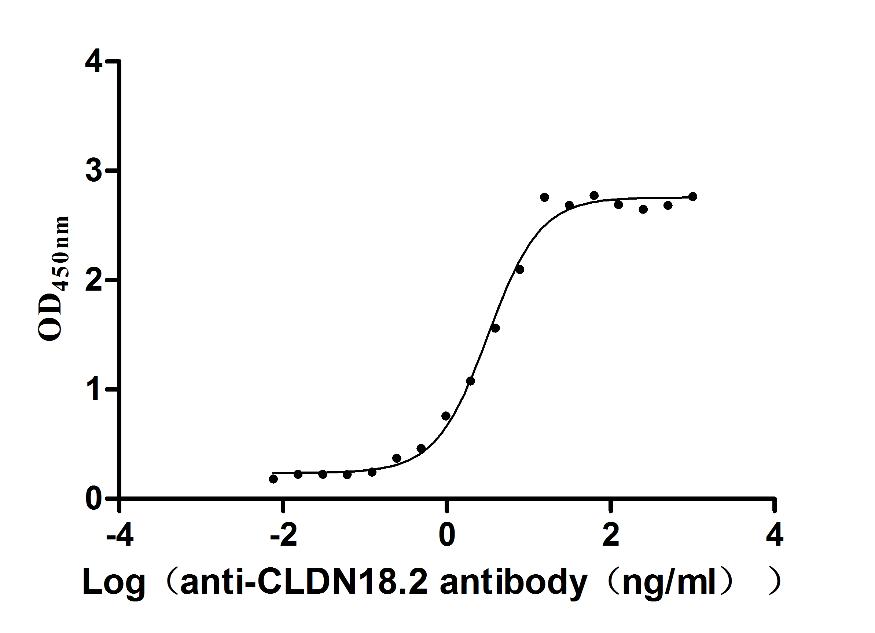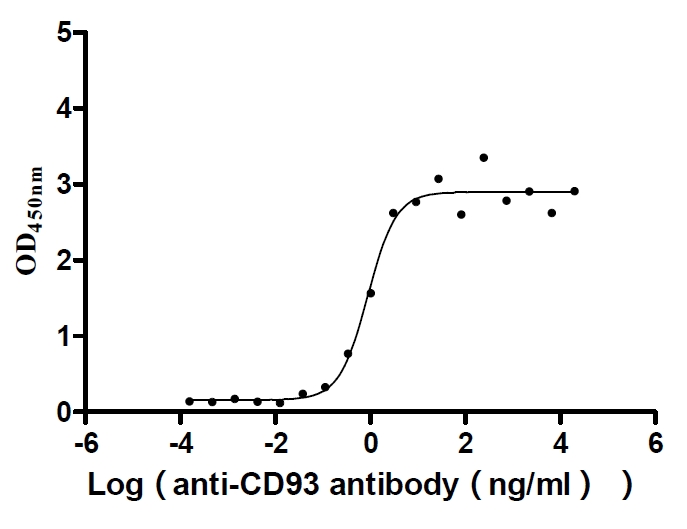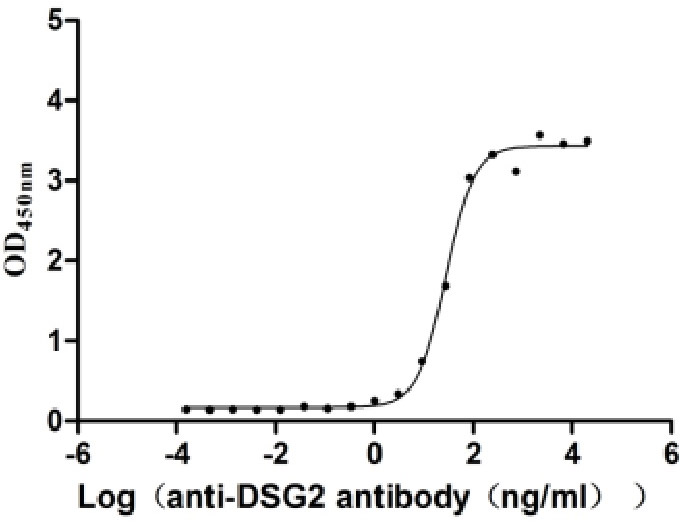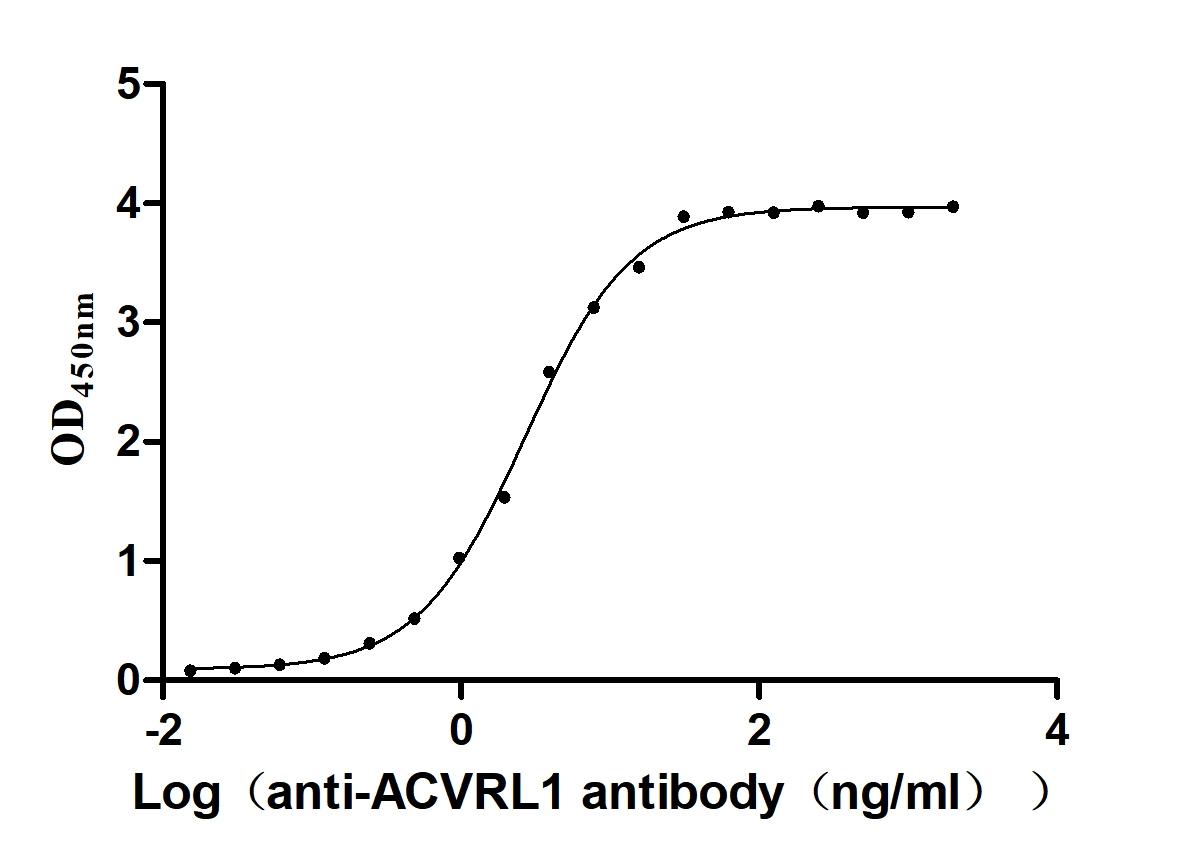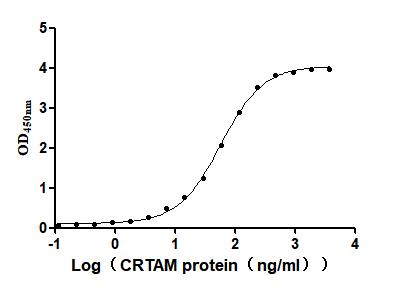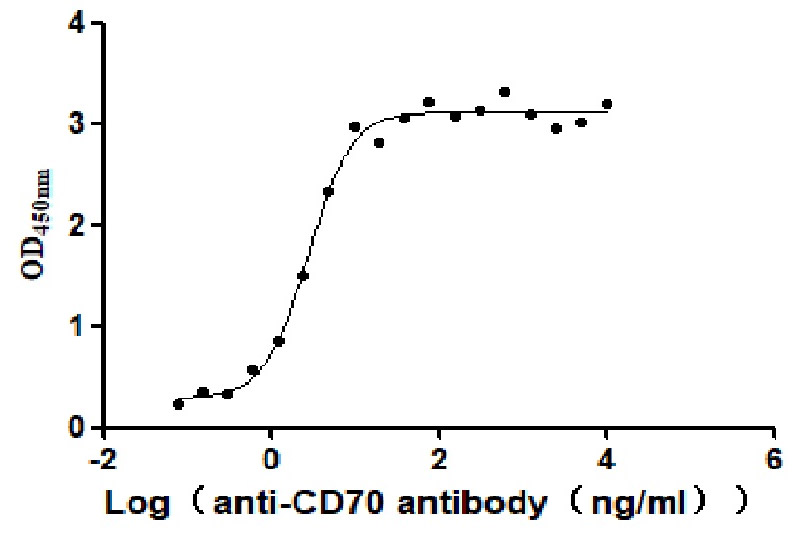Recombinant Pig Transforming growth factor beta-1 (TGFB1)
-
货号:CSB-YP023446PI
-
规格:
-
来源:Yeast
-
其他:
-
货号:CSB-EP023446PI
-
规格:
-
来源:E.coli
-
其他:
-
货号:CSB-EP023446PI-B
-
规格:
-
来源:E.coli
-
共轭:Avi-tag Biotinylated
E. coli biotin ligase (BirA) is highly specific in covalently attaching biotin to the 15 amino acid AviTag peptide. This recombinant protein was biotinylated in vivo by AviTag-BirA technology, which method is BriA catalyzes amide linkage between the biotin and the specific lysine of the AviTag.
-
其他:
-
货号:CSB-BP023446PI
-
规格:
-
来源:Baculovirus
-
其他:
-
货号:CSB-MP023446PI
-
规格:
-
来源:Mammalian cell
-
其他:
产品详情
-
纯度:>85% (SDS-PAGE)
-
基因名:
-
Uniprot No.:
-
别名:TGFB1; Transforming growth factor beta-1 proprotein [Cleaved into: Latency-associated peptide; LAP); Transforming growth factor beta-1; TGF-beta-1)]
-
种属:Sus scrofa (Pig)
-
蛋白长度:Full Length of Mature Protein
-
表达区域:30-278
-
氨基酸序列L STCKTIDMEL VKRKRIEAIR GQILSKLRLA SPPSQGDVPP GPLPEAVLAL YNSTRDRVAG ESVEPEPEPE ADYYAKEVTR VLMLESGNQI YDKFKGTPHS LYMLFNTSEL REAVPEPVLL SRAELRLLRL KLKVEQHVEL YQKYSNDSWR YLSNRLLAPS DSPEWLSFDV TGVVRQWLTR REAIEGFRLS AHCSCDSKDN TLHVEINGFN SGRRGDLATI HGMNRPFLLL MATPLERAQH LHSSRHRR
-
蛋白标签:Tag type will be determined during the manufacturing process.
The tag type will be determined during production process. If you have specified tag type, please tell us and we will develop the specified tag preferentially. -
产品提供形式:Lyophilized powder
Note: We will preferentially ship the format that we have in stock, however, if you have any special requirement for the format, please remark your requirement when placing the order, we will prepare according to your demand. -
复溶:We recommend that this vial be briefly centrifuged prior to opening to bring the contents to the bottom. Please reconstitute protein in deionized sterile water to a concentration of 0.1-1.0 mg/mL.We recommend to add 5-50% of glycerol (final concentration) and aliquot for long-term storage at -20℃/-80℃. Our default final concentration of glycerol is 50%. Customers could use it as reference.
-
储存条件:Store at -20°C/-80°C upon receipt, aliquoting is necessary for mutiple use. Avoid repeated freeze-thaw cycles.
-
保质期:The shelf life is related to many factors, storage state, buffer ingredients, storage temperature and the stability of the protein itself.
Generally, the shelf life of liquid form is 6 months at -20°C/-80°C. The shelf life of lyophilized form is 12 months at -20°C/-80°C. -
货期:Delivery time may differ from different purchasing way or location, please kindly consult your local distributors for specific delivery time.Note: All of our proteins are default shipped with normal blue ice packs, if you request to ship with dry ice, please communicate with us in advance and extra fees will be charged.
-
注意事项:Repeated freezing and thawing is not recommended. Store working aliquots at 4°C for up to one week.
-
Datasheet :Please contact us to get it.
相关产品
靶点详情
-
功能:Transforming growth factor beta-1 proprotein: Precursor of the Latency-associated peptide (LAP) and Transforming growth factor beta-1 (TGF-beta-1) chains, which constitute the regulatory and active subunit of TGF-beta-1, respectively.; Required to maintain the Transforming growth factor beta-1 (TGF-beta-1) chain in a latent state during storage in extracellular matrix. Associates non-covalently with TGF-beta-1 and regulates its activation via interaction with 'milieu molecules', such as LTBP1, LRRC32/GARP and LRRC33/NRROS, that control activation of TGF-beta-1. Interaction with LRRC33/NRROS regulates activation of TGF-beta-1 in macrophages and microglia. Interaction with LRRC32/GARP controls activation of TGF-beta-1 on the surface of activated regulatory T-cells (Tregs). Interaction with integrins (ITGAV:ITGB6 or ITGAV:ITGB8) results in distortion of the Latency-associated peptide chain and subsequent release of the active TGF-beta-1.; Multifunctional protein that regulates the growth and differentiation of various cell types and is involved in various processes, such as normal development, immune function, microglia function and responses to neurodegeneration. Activation into mature form follows different steps: following cleavage of the proprotein in the Golgi apparatus, Latency-associated peptide (LAP) and Transforming growth factor beta-1 (TGF-beta-1) chains remain non-covalently linked rendering TGF-beta-1 inactive during storage in extracellular matrix. At the same time, LAP chain interacts with 'milieu molecules', such as LTBP1, LRRC32/GARP and LRRC33/NRROS that control activation of TGF-beta-1 and maintain it in a latent state during storage in extracellular milieus. TGF-beta-1 is released from LAP by integrins (ITGAV:ITGB6 or ITGAV:ITGB8): integrin-binding to LAP stabilizes an alternative conformation of the LAP bowtie tail and results in distortion of the LAP chain and subsequent release of the active TGF-beta-1. Once activated following release of LAP, TGF-beta-1 acts by binding to TGF-beta receptors (TGFBR1 and TGFBR2), which transduce signal. While expressed by many cells types, TGF-beta-1 only has a very localized range of action within cell environment thanks to fine regulation of its activation by Latency-associated peptide chain (LAP) and 'milieu molecules'. Plays an important role in bone remodeling: acts as a potent stimulator of osteoblastic bone formation, causing chemotaxis, proliferation and differentiation in committed osteoblasts. Can promote either T-helper 17 cells (Th17) or regulatory T-cells (Treg) lineage differentiation in a concentration-dependent manner. At high concentrations, leads to FOXP3-mediated suppression of RORC and down-regulation of IL-17 expression, favoring Treg cell development. At low concentrations in concert with IL-6 and IL-21, leads to expression of the IL-17 and IL-23 receptors, favoring differentiation to Th17 cells. Stimulates sustained production of collagen through the activation of CREB3L1 by regulated intramembrane proteolysis (RIP). Mediates SMAD2/3 activation by inducing its phosphorylation and subsequent translocation to the nucleus. Can induce epithelial-to-mesenchymal transition (EMT) and cell migration in various cell types.
-
基因功能参考文献:
- TGF-beta1 is activated or inactivated by MMP20 or KLK4 and that the amelogenin cleavage product is necessary for the in-solution mobility of TGF-beta1. PMID: 27633089
- Activated TGF-beta signaling rescued miR-143-reduced FSHR and intracellular signaling molecules, and miR-143-induced porcine granulosa cell apoptosis. PMID: 27882941
- TGF-beta1-induced epithelial-myofibroblast plasticity is FAK- dependent, whereas TGF-beta1-induced apoptosis is favored when FAK signaling is inhibited. PMID: 28360109
- this study shows that TGF-beta1 protects intestinal integrity and influences Smad and MAPK signal pathways in intestinal epithelium cells after TNF-alpha challenge PMID: 28142299
- this study shows that anemonin may ameliorate LPS-induced intestinal injury and improve restoration by regulating the TGF-b1 and EGFR signaling pathways PMID: 27189428
- The results indicated that TGF-beta-1 was associated with the restoration of intestinal morphology and barrier function following weaning stress. PMID: 25170924
- Data (including data from in vitro and in vivo experiments) suggest that day 14 elongated conceptus secretes proteins that up-regulate TGFbeta1 mRNA and TGFbeta1 expression in endometrium; TGFbeta1 may be important during pregnancy maintenance. PMID: 24042214
- The effects of semen, spermatozoa in extender, or extender alone on the expression of TGF-beta1, IL-10, and IL-6 in ovarian follicles are reported. PMID: 24020676
- Dietary (1,3/1,6)-beta-D-glucan reduced the mRNA expression of transforming growth factor (TGF) beta2 and tended to reduce the mRNA expression of TGF-beta1 in lung tissue of neonatal piglet. PMID: 23602250
- TGF-beta1, via TGF-beta1 receptor I and p38 MAPK signaling, reduces CFTR expression to impair CFTR-mediated anion secretion, which would likely compound the effects associated with mild CFTR mutations and ultimately would compromise male fertility. PMID: 23903699
- High yield isolation of BMP-2 from bone and in vivo activity of a combination of BMP-2/TGF-beta1. PMID: 22927042
- Boar seminal plasma contained TGF- beta1 and IL-10 but with high individual variation. PMID: 22482797
- The present study was aimed to determine the association between metalloproteinase 3 (MMP3), transforming growth factor beta 1 (TGFbeta1) and collagen type X alpha I (COL10A1) gene polymorphisms with traits related to leg weakness in pigs. PMID: 21739142
- Inhibition of transforming growth factor beta-1 augments liver regeneration after partial portal vein ligation in a porcine experimental model. PMID: 22251543
- TGF-beta prevents excessive heart valve growth under normal physiological conditions while it promotes cell proliferation in the early stages of repair. PMID: 21851806
- Crystals of dimeric porcine proTGF-beta1 reveal a ring-shaped complex, a novel fold for the prodomain, and show how the prodomain shields the growth factor from recognition by receptors and alters its conformation. PMID: 21677751
- The effects of different polymorphisms of TGF-beta1 on litter size in Large white pigs are reported. PMID: 20088852
- TGF-beta disrupts an IGF-II-stimulated autocrine amplification cascade that is necessary for muscle differentiation in vitro. PMID: 21106882
- beta-Catenin plays a critical role in mediating TGF-beta1-induced myofibroblast differentiation in aortic valve interstitial cells. PMID: 21127288
- Results suggest that Rac1 and RhoA are regulated by TGFbeta1 in the process of endothelial tube formation in collagen I gels. PMID: 16978608
- TGFbeta may play a role in the overall process of luteinization, but it appears not to influence steroidogenesis in luteinizing pig follicles. PMID: 20378284
- Elevated circulating TGF-beta(1) causes endothelial dysfunction through NADPH oxidase activation-induced oxidative stress, accelerating atherosclerosis and hypertension in apoE(-/-) mice. PMID: 20511416
- TGFbeta stimulation of ANK expression is dependent upon the influx of phosphate and calcium into ATDC5 cells at all stages of differentiation. PMID: 20432454
- Data suggest that focal adhesion kinase (FAK)-SMAD 2/3 mediate signal crosstalk between type II collagen and TGF-beta1 and regulate glycosaminoglycan secretion in chondrocytic cells. PMID: 19840848
- show that histone deacetylase 4 overexpression promotes TGF-beta1-induced synovium-derived stem cells chondrogenesis but inhibits chondrogenically differentiated stem cell hypertrophy. PMID: 19716643
- multiple effects of TGFbeta at the porcine conceptus-maternal interface, including integrin-mediated conceptus-maternal communication through LAP PMID: 15961561
- Repeated injection of adenovirus expressing porcine TGF-beta1 may be useful model for studying Peyronie's disease. PMID: 17651407
- identification of six quantitative trait loci for diabetes-related traits in F(2)-D Tgf/Tgf and F(2)-C Tgf/Tgf pigs PMID: 18160996
- FGF2 effectively blocks transforming growth factor-beta1 (TGF-beta1)-mediated myofibroblast activation PMID: 18218921
- Using the model of porcine aortic endothelial cells, we demonstrated that TGFbeta stimulates cellular spreading when cells are on collagen I; TGFbeta-stimulated Rac1-GTP accumulation, which was associated with increased MAPK p38 phosphorylation. PMID: 18387002
- Wounding activates valve interstitial cell (VICs), and TGF-beta signaling modulates VIC response to injury. PMID: 18832581
- Altered shear stress stimulates upregulation of endothelial VCAM-1 and ICAM-1 in a BMP-4- and TGF-beta1-dependent pathway. PMID: 19023092
- pTGF-beta1 induces human fibroblast synthesis & secretion of ET-1. TGF-beta1 activation of PI3K/AKT is not dependent on ET-1. ET-1 & TGF-beta1 independently promote fibroblast resistance to apoptosis through p38 MAPK & PI3K/AKT. PMID: 19188658
- transforming growth factor beta has a role in the regulation of thyroid function and growth [review] PMID: 19645615
显示更多
收起更多
-
亚细胞定位:[Latency-associated peptide]: Secreted, extracellular space, extracellular matrix.; [Transforming growth factor beta-1]: Secreted.
-
蛋白家族:TGF-beta family
-
数据库链接:
KEGG: ssc:397078
STRING: 9823.ENSSSCP00000003267
UniGene: Ssc.76
Most popular with customers
-
Recombinant Human Programmed cell death 1 ligand 1 (CD274), partial (Active)
Express system: Mammalian cell
Species: Homo sapiens (Human)
-
Recombinant Human Glucagon receptor (GCGR), partial (Active)
Express system: Mammalian cell
Species: Homo sapiens (Human)
-
Recombinant Macaca fascicularis Claudin (CLDN18)-VLPs (Active)
Express system: Mammalian cell
Species: Macaca fascicularis (Crab-eating macaque) (Cynomolgus monkey)
-
Recombinant Human Complement component C1q receptor (CD93), partial (Active)
Express system: Mammalian cell
Species: Homo sapiens (Human)
-
Recombinant Human Desmoglein-2 (DSG2), partial (Active)
Express system: Mammalian cell
Species: Homo sapiens (Human)
-
Recombinant Human Serine/threonine-protein kinase receptor R3 (ACVRL1), partial (Active)
Express system: Baculovirus
Species: Homo sapiens (Human)
-
Recombinant Mouse Cytotoxic and regulatory T-cell molecule (Crtam), partial (Active)
Express system: Mammalian cell
Species: Mus musculus (Mouse)
-
Recombinant Human CD70 antigen (CD70), partial (Active)
Express system: Mammalian cell
Species: Homo sapiens (Human)


